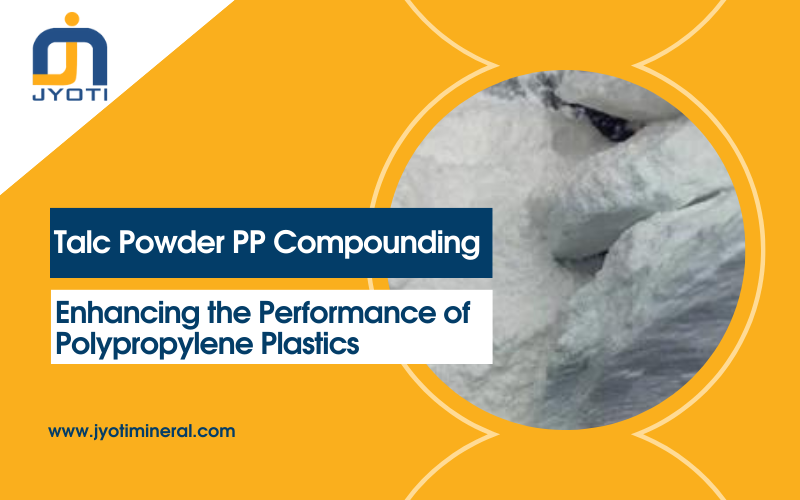When it comes to improving the performance of polypropylene (PP) compounds, talc powder plays a pivotal role. From automotive applications to household items, talc-filled polypropylene compounds are highly valued for their enhanced mechanical properties and cost-effectiveness. At Jyoti Mineral Industries, we specialize in manufacturing high-quality talc powder that is ideal for PP compounding across various industries.
What is Talc Powder PP Compounding?
Talc powder is a naturally occurring mineral that consists of magnesium, silicon, and oxygen. When used in polypropylene compounding, it enhances the mechanical and thermal properties of the plastic, making it more durable, heat-resistant, and flexible.
Polypropylene (PP) is widely used in industries such as automotive, packaging, household goods, and construction. However, on its own, PP may not have the desired mechanical strength or rigidity for certain high-performance applications. This is where talc powder comes into play. By adding talc powder during the compounding process, manufacturers can significantly improve the strength, stiffness, and impact resistance of PP materials.
Key Benefits of Talc Powder in PP Compounding
1. Enhanced Stiffness and Rigidity
Talc-filled polypropylene is known for its increased stiffness, making it ideal for applications that require strong structural integrity. It is especially beneficial for automotive parts like bumpers and dashboards, where rigidity is crucial for performance and safety.
2. Improved Heat Resistance
Talc powder improves the heat deflection temperature (HDT) of PP compounds. This means that talc-filled PP can withstand higher temperatures without deforming, making it suitable for high-temperature environments in automotive and industrial applications.
3. Cost-Effective Solution
Talc powder is a cost-effective filler that reduces the overall material cost without compromising the quality or performance of polypropylene compounds. By replacing a portion of the plastic with talc, manufacturers can achieve significant cost savings.
4. Better Dimensional Stability
Talc powder helps maintain the shape and dimensions of polypropylene products over time. This is especially important in industries like automotive and engineering, where precision and stability are key.
5. Increased Impact Strength
Contrary to common belief, talc powder also enhances the impact resistance of polypropylene. This is particularly valuable for products that undergo frequent handling, stress, or mechanical force.
Applications of Talc Powder PP Compounding
At Jyoti Mineral Industries, our talc powder is widely used in PP compounding for a variety of applications, including:
Why Choose Jyoti Mineral Industries for Talc Powder PP Compounding?
At Jyoti Mineral Industries, we have been at the forefront of talc powder manufacturing for various industrial applications. Our expertise lies in producing high-purity talc powder that meets stringent quality standards and is tailored to specific industry needs. We cater to a wide range of industries, including automotive, engineering plastics, agriculture, cosmetics, and more.
Our talc powder for PP compounding offers:
Talc powder is an essential ingredient in polypropylene compounding, offering a cost-effective way to enhance the material’s mechanical strength, rigidity, and heat resistance. Whether you’re in the automotive, packaging, or household goods industry, talc-filled PP can provide the performance you need for high-quality, durable products. Jyoti Mineral Industries is your trusted partner for premium talc powder that can be customized to meet your unique compounding requirements.
For more information about our talc powder for PP compounding, contact Jyoti Mineral Industries today and let us help you optimize your manufacturing process with superior materials.

